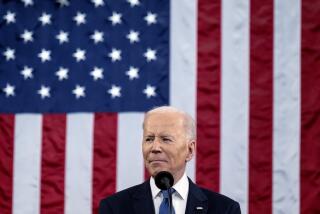Obama pushes global effort
Even as it spends hundreds of billions of dollars to revive the U.S. economy, the Obama administration is opening a second front -- pressing European and other nations to launch bigger efforts to stimulate their own economies.
The campaign, coming to the forefront this weekend at an international conference of finance ministers in London, is designed to attack the worldwide recession with a coordinated global stimulus effort. The message from U.S. officials is clear -- we can’t do it alone.
Stagnant economies need corresponding shots in the arms to create demand for products and services, government officials believe. The world is more intertwined than ever, and injecting money into financial systems everywhere will make it less onerous on any one country, they said.
China, for example, is pumping the equivalent of billions of dollars into its economy, but the efforts of Japan, Britain, France, Germany and other major nations are falling short, according to the International Monetary Fund.
“If the rest of the world will get their demand growing more rapidly, that will boost U.S. exports, which will boost employment and demand in the United States,” said Michael Mussa, senior fellow at the Peterson Institute for International Economics.
As Mussa and many others see it, what happens to the world economy has a major effect on the well-being of the United States, where a sharp drop in exports in the last quarter helped fuel the most dramatic retrenchment of the U.S. economy since 1982.
If the world economy doesn’t revive soon, the deep U.S. recession will last much longer, they said.
But in Europe, especially, where national economies and cross-border trade are much more integrated, fear of one country’s tax dollars boosting another country’s fortunes has led to a kind of paralysis in which nobody wants to do too much.
“If you are a small country like the Netherlands or Denmark, then a large part of your stimulus will not stimulate your economy, but other countries’ economies,” said Jakob von Weizsacker, a resident scholar at Bruegel, a Brussels think tank. “If you do it on a global level, then you can capture all the cross-border spillover.”
The $787-billion stimulus package that President Obama signed into law is a drop in the bucket for a world economy that produces $78 trillion in goods and services each year.
And that economy, infected by the financial crisis that began with the collapse of the U.S. housing market, has begun to stagger: A new World Bank projection says the global economy will shrink this year for the first time since World War II.
Many European countries are reluctant to embrace the bigger budget deficits and higher national debts that come with the increased tax cuts and spending of a large stimulus package.
Lawrence Summers, Obama’s chief economic advisor, told the Financial Times this week that the Group of 20 leading and developing nations, known as G-20, need to stimulate more economic demand. The message appeared targeted directly at Europe.
Spain is the only European nation whose stimulus efforts this year meet the International Monetary Fund’s target of at least 2% of the country’s total economic output. The only other advanced economies meeting that goal are the United States, China, Australia and Saudi Arabia.
But Jean-Claude Juncker, chairman of a group of 16 finance ministers whose nations use the euro, dismissed the Obama administration’s push, telling reporters that finance ministers from those countries were not prepared to do more of a stimulus at this point.
He added that “recent American appeals insisting Europeans make an added budgetary effort were not to our liking.”
White House Press Secretary Robert Gibbs said that addressing such concerns was “why we have summits.” Obama will push for both stimulus and regulatory reform when he attends a meeting of the G-20 leaders next month.
“Whether it’s regulation or stimulus, if many nations work collectively in concert, the impact to the global economy will only be sharper and stronger,” Gibbs said.
More economic stimulus also would share the burden of halting what the head of the IMF on Tuesday called “a Great Recession.”
“There’s something to be said for everyone being in this together, so somebody’s not living off everybody else’s stimulus rather than contributing their own,” Mussa said.
Part of the Obama administration’s problem is that the downturn that began in the United States has only recently hit hard elsewhere, delaying policy responses.
Some major European nations, such as France, want to focus first on reforming the regulatory system that allowed the financial crisis to begin in the first place.
Also, countries such as Japan and Italy have high national debt levels that make more borrowing for fiscal stimulus extremely difficult.
And although Washington’s activist response to the recession has been shaped in part by lessons learned during the Great Depression, other countries have different experiences.
Germany, for example, faced extremely high inflation in the 1920s because of large government spending after World War I, and still is leery of those types of expenditures.
But economists agree that more global economic stimulus would help reverse the recession in an increasingly interconnected marketplace.
“The probability for a reasonably quick, successful recovery is smaller without a coordinated response by the major countries,” said Ross Levine, director of the William R. Rhodes Center for International Economics at Brown University.
Obama said that in a meeting with British Prime Minister Gordon Brown last week they discussed how they could get the G-20 countries to stimulate their economies “in a coordinated fashion.”
One lesson from the Great Depression was “worldwide expansionary policy shares the burdens and the benefits of recovery,” Christina Romer, head of the Council of Economics Advisors, said Monday in a speech at the Brookings Institution.
“I think it is vital . . . that all countries that have a capacity to take steps to stimulate demand in their own economies do so,” said Brad Setser, a geo-economics fellow at the Council on Foreign Relations.
“You need all the sources of demand that are available,” he said, “because there’s such a huge shortfall in demand coming from the private sector.”
--
More to Read
Inside the business of entertainment
The Wide Shot brings you news, analysis and insights on everything from streaming wars to production — and what it all means for the future.
You may occasionally receive promotional content from the Los Angeles Times.











